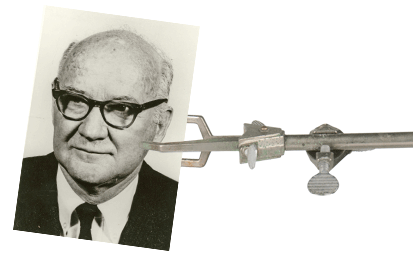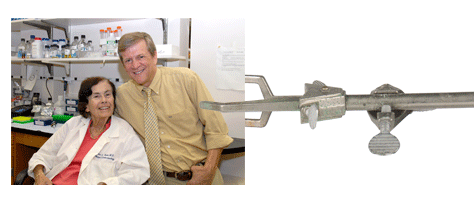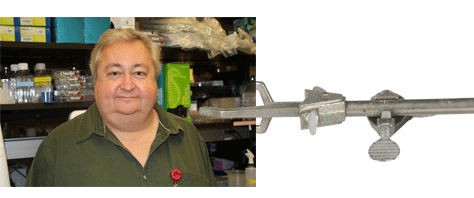Distinguished Faculty

Robert Petrie Walton, M.D., Ph.D., joined the faculty of the Medical College of the State of South Carolina in 1942 as a professor and chairman of the Department of Pharmacology. During his 29-year career at the Medical College, Dr. Walton coordinated research programs and was among the first faculty to receive federal funding for research.
He was also closely involved in the establishment of the Graduate Committee of the School of Medicine which developed into MUSC’s College of Graduate Studies.
Dr. Walton did extensive cardiovascular research and designed the first strain gauge arch to quantitatively measure the contractile force of the heart. The Walton-Brodie strain gauge arch was used for many years by numerous national and international scientists interested in how the heart generates the force necessary to pump the blood through the blood vessels. It was sewed onto the outside of the heart muscle to measure the force of the contraction of the heart, beat by beat. It was used experimentally in animal studies and was ultimately used in patients undergoing open-heart surgery. With the use of the strain gauge arch, physiologists and pharmacologists were able to understand how drugs work to affect the way in which the heart generates its force of contraction in response to drugs, physiologic stimuli and diseases. The device was manufactured at the Medical University and shipped all over the United States and the world. Though the device is no longer in use, the lessons learned from using it provides the basis for current understanding of how the heart works today.
At the time of his death, Dr. Walton was the principal investigator of one of the oldest continuous research grants of the National Heart and Lung Institute, National Institutes of Health. Under the 24-year grant, Dr. Walton and his colleagues in the Department of Pharmacology, including machinist O. J. Brodie, designed and manufactured the strain gauge arch, a device for measuring the contractile force of the heart.

Maria G. Buse, M.D., was born in Budapest, Hungary in 1927.
She attended medical schools at Pazmany Peter University School of Medicine in Hungary and at Switzerland’s University of Basel School of Medicine, before graduating from the University of Buenos Aires School of Medicine in 1956.
While in Argentina, Dr. Buse worked in research with Nobel laureate in physiology, Bernardo Houssay, M.D., who arranged a fellowship in medicine for her at the University of Pennsylvania Hospital and at the Cox Institute. In 1957 she joined the faculty of the Department of Medicine in the College of Medicine.
As a research associate in the Department of Medicine, Dr. Buse co-founded the division of endocrinology with her husband, Dr. John Buse, and established the nuclear medicine department. She served as its director until 1983. Her areas of research include diabetes, insulin resistance, and insulin receptor regulation. Dr. Buse is believed to hold one of the longest-running NIH grants in the country, “Factors that Modify Insulin Action.”
Over the course of her 50-plus years of service to MUSC, Dr. Buse has earned many honors and awards, including the American Diabetes Association Albert Renold Award (2003), the Health Science Foundation Distinguished Faculty Service Award (1998), and the Governor’s Award for Excellence in Science Research (1996). In 2003 MUSC awarded Dr. Buse its Distinguished University Professor Award, making her the first female recipient of that award. In 2008 she received the College of Medicine’s Honorary Alumnus Award.
Since 2002 the College of Graduate Studies has established a tradition of recognizing its outstanding teachers in the first-year core curriculum who play a pivotal role in providing students with the core information and tools necessary to become outstanding scientists.
Charles Burant, M.D., Ph.D., received both his degrees in 1987. He is currently professor of internal medicine, professor of molecular integrative physiology, and the Robert C. and Veronica Atkins Professor of Metabolism at the University of Michigan.
Dr. Burant is nationally and internationally known for his basic and clinical research on the cause and treatment of obesity and type-2 diabetes.

Craig Beeson, Ph.D., associate professor of pharmaceutical and biomedical sciences, has consistently been recognized as one of the college’s most outstanding teachers.
